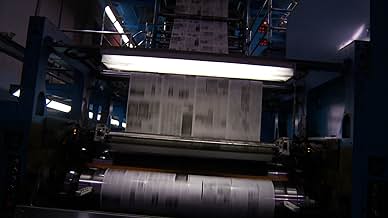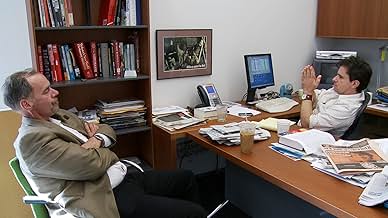Agrega una trama en tu idiomaUnprecedented access to the New York Times newsroom yields a complex view of the transformation of a media landscape fraught with both peril and opportunity.Unprecedented access to the New York Times newsroom yields a complex view of the transformation of a media landscape fraught with both peril and opportunity.Unprecedented access to the New York Times newsroom yields a complex view of the transformation of a media landscape fraught with both peril and opportunity.
- Premios
- 3 premios ganados y 10 nominaciones en total
- Dirección
- Guionistas
- Todo el elenco y el equipo
- Producción, taquilla y más en IMDbPro
Argumento
¿Sabías que…?
- Citas
Shane Smith: I'm a regular guy and I go to these places and I go, "OK, everyone talked to me about cannibalism, right? Everyone talked about cannibalism." Now I'm getting a lot of shit for talking about cannibalism. Whatever. Everyone talked to me about cannibalism! That's fucking crazy! So the actual... our audience goes, 'That's fucking insane, like, that's nuts!' The New York Times, meanwhile, is writing about surfing, and I'm sitting there going like, 'You know what? I'm not going to talk about surfing, I'm going to talk about cannibalism, because that fucks me up.'
David Carr: Just a sec. Time out. Before you ever went there, we've had reporters there reporting on genocide after genocide. Just because you put on a fucking safari helmet and looked at some poop doesn't give you the right to insult what we do. So, continue.
- ConexionesFeatured in De wereld draait door: Episode #6.173 (2011)
- Bandas sonorasLost in Detroit
Written and performed by Rolfe Kent
From the motion picture Amor sin escalas (2009)
Courtesy of Paramount Pictures
This story is told primarily from the perspective of the staff on the media desk; editor Bruce Headlam, columnist David Carr and correspondent Brian Stelter. These are the guys in the unenviable position of reporting on (amongst other things) the bankruptcy of other newspapers caused by the growth of online news and the drop in advertising and circulation revenues. Carr in particular gets most of the screen time, and deservedly so. He is a profane and fiercely intelligent presence with a back-story worthy of Hollywood itself, while Stelter is that unique case of someone who started out as an anonymous news blogger before moving over to print media. After outing his identity in a series of stories about his site, the Times then went and offered him a job. He is one of the new breed – a journalist who embraces the advantages of developing technology. He is seen at his cubicle with several computers running, tweeting about his stories, even bringing in a brand new iPad to demonstrate to his dumbfounded old-school colleagues.
Rossi spent a year in the Times newsroom and the film covers a variety of stories and issues covered by the paper in that time, including the Iraq War; Carr's piece on the bankruptcy of the Tribune Company (which he linked directly to mismanagement by its new owner Sam Zell and his executives); and the explosion of Wikileaks into the public consciousness with their publication of the Afghan War logs. This last is also compared to the similar case of the infamous Pentagon Papers leak in 1971 by Daniel Ellsberg to the Times. The advances in the internet have essentially done away with the idea of a Deep Throat. No longer will an insider source need to work with a reporter. Now they can just go online and tell their tale to everyone. While this means that "the truth will out" so much more, it also takes away that important middle step of fact-checking, confirming and crafting a story that a properly trained and respected journalist provides.
In its examination of the slowly dwindling print business, this film covers similar territory to the final season of The Wire. David Simon built the conclusion of his opus around a somewhat fictionalised version of his own former haunt, the Baltimore Sun. Simon features in this movie briefly as well, in a short clip of a televised debate on the dying art of a reporter working a beat that also included Arianna Huffington of the all-conquering Huffington Post. He raises a very solid point though: even with everyone and his wife blogging the news from their bedrooms, there will always be a place for the reporter on the scene, notebook in hand. The delivery method may change with the times (pardon the pun) but the infrastructure, methods and ethics of the newspaper will always be necessary. The "more with less" evangelists are having their day in the sun, but hopefully a new day will dawn soon enough. The best way to make sure that happens is to accept the fact that news costs. The film touches on the idea of pay-walls on the online versions of the paper. I'm all for these personally. You have to pay for the physical newspaper, why shouldn't you pay for the digital version?
It's rare that I get to say this, but all the poster quotes are true. This is a fascinating film that covers a lot of ground in only 92 minutes. Now if you'll excuse me, I'm off to buy my online subscription to the New York Times.
- mcneely_dave
- 18 may 2012
- Enlace permanente
Selecciones populares
Detalles
Taquilla
- Total en EE. UU. y Canadá
- USD 1,067,028
- Fin de semana de estreno en EE. UU. y Canadá
- USD 28,911
- 19 jun 2011
- Total a nivel mundial
- USD 1,077,982
- Tiempo de ejecución1 hora 32 minutos
- Color
- Mezcla de sonido
Contribuir a esta página































